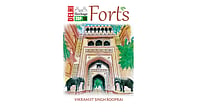Tram 83, a bustling nightclub in the middle of the mean streets of CDR. It seems like a brothel, until you figure it’s more respectable. You got the time to figure it out? Jazz shuffles all the time and the language has a kind of Coltrane beat to it, or perhaps a touch of Marlon James—bad language numbering of the rear ends of the night chicks and their silicone implants. The town has no name, though Tram 83 is the place where diggers gather along with the grifters and the hookers, and the town is part of a state ruthlessly run by a warlord. Sandwiched in the middle is obviously a poet without a prayer, Lucien from the Back Country, trying to mine money and a publisher or both in the mean streets of a mineral city. He shocks denizens of this dark world with his note-taking and his trips through pages of history, rather than drugs. Lucien’s bromancer is Requiem, all sleaze and cynicism, a man without a notebook to his name.
The dynamic duo of alter egos dive into the seamy depths of life both INSide and out of Tram 83 and it’s a toss-up as to who will survive. Requiem’s on the make, with hands and morals all over the place, while Lucien tows the lyrical line. Obviously, Mujila has set the pace deliberately to have the reader guessing in between all those come-ons from the whores. Which way of life is going to win through? Will Lucien finally surrender to the way of all flesh? Or Requiem rise to a beatified cloud nine, despite sending Lucien to a torture chamber? Requiem, Lucien and his publisher catch the wrong kind of attention. In Mujila’s Tram 83, It’s a wily war out there.
Tram 83 is a mishmash of all kinds of language and is a satire on the way the fate wind blows in small towns with no hope. Some things are worth a guesstimate—sexual grapplings, lewd talk, dhanda gone under in a place that history has labelled dangerous. Vitality leaps through the smut and shanties and grapples with all the downers like an amphetamine fix.
Occasionally, it seems like you’re OD-ing on facts—Mujila’s world scrabbles here and there through jazz, rumba, Brazilian buttocks and other arcana. But hey, you can also talk through torture as fine art or music as speleology of the soul. For foodies, there’s Congolese cuisine a la dog kebabs with saffron potatoes or cat and olive stew, the handiest cheapest cuts to be hooked off the backstreets or from people’s homes. Everyone gossips, talks some more, proffers those come-ons—baby chicks, single mamas and all, gives opinions and generally shoots their mouths off faster than the warlord can sling bullets. Mujila time-travels between conversations and occasionally repeats them too— ‘do you have the time’ is the chorus—or perhaps the Tram 83 habitues are habituated to saying the same thing when inspiration runs aground.
In this country, it’s an approximation of the backwaters of Bihar and Jharkhand, fuelled on drugs and coal mafia with water shortages and a heart of darkness—so nothing’s really strange happening in Tram 83. The powerful defecate in the mouths of the less powerful and the game goes on. At the end of it, you take a deep breath.
What does grab mindspace is the vitality of the language, translated from the French by Roland Glasser. It almost turns somersaults with crackling energy and gives non-French readers a taste of the real thing.


























